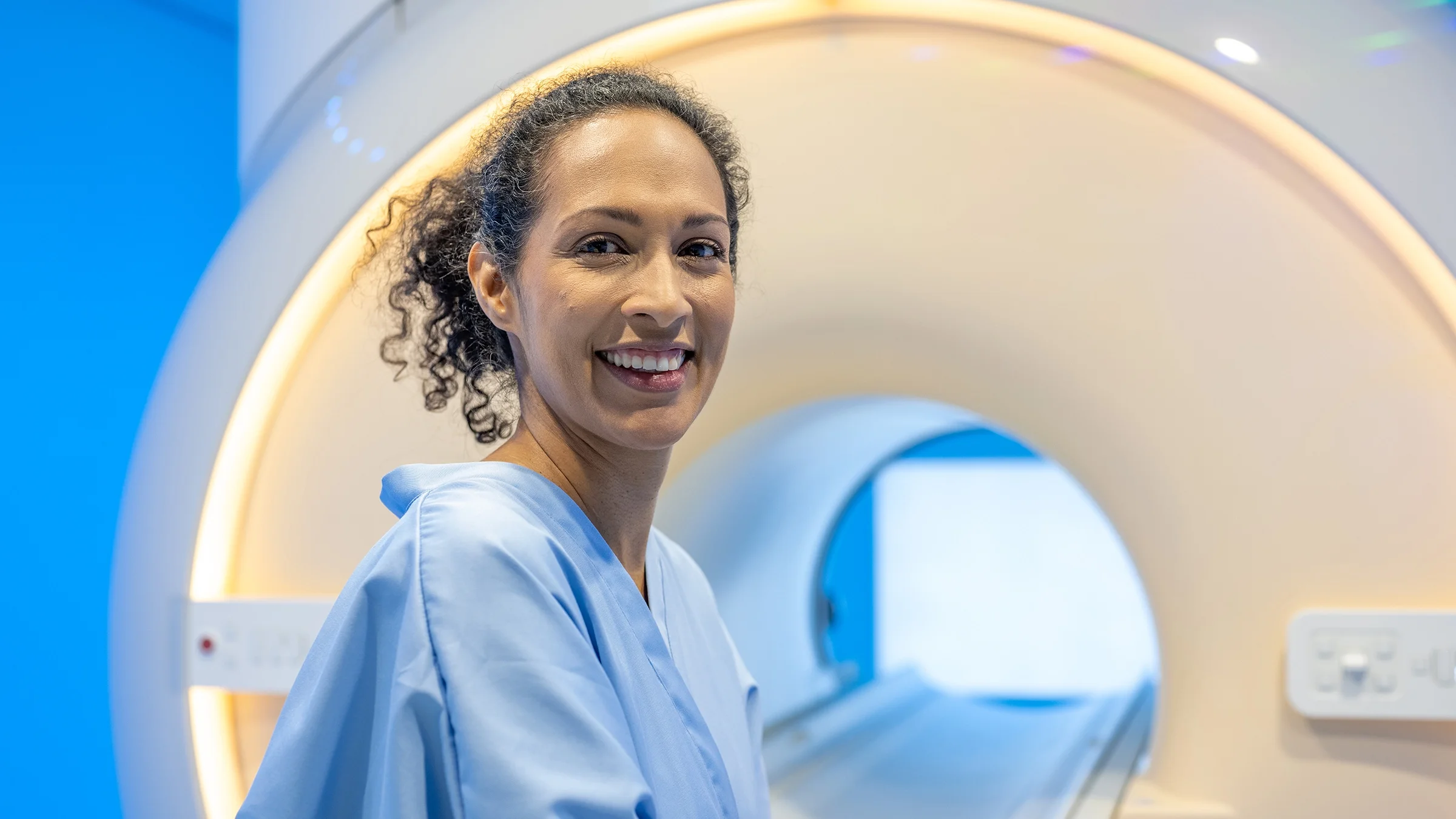Key takeaways:
Healthcare professionals sometimes recommend breast MRIs after breast cancer screening mammograms if they need more information. These scans are also helpful in other circumstances, such as for monitoring breast cancer treatments.
Without insurance, conventional breast MRIs cost about $950 on average nationwide. If appropriate for you, an abbreviated scan called a fast breast MRI typically costs from $250 to $500.
Some health insurance plans won’t cover a conventional breast MRI when it’s used as a secondary breast cancer screening on a woman at average risk of breast cancer. Several states have laws that mandate certain health insurance plans cover breast MRIs when they are medically necessary secondary screenings.
Under the Affordable Care Act (ACA), most health insurance plans cover mammograms as preventive care with no out-of-pocket costs. When mammograms are inconclusive, radiologists often need to investigate results further with a secondary screening such as breast MRI. You may require this additional test if you have dense breasts or a family history of breast cancer.
About 1 in 7 women will need additional imaging after a mammogram. Some health insurance plans won’t cover breast MRIs in this scenario because they are considered diagnostic exams and not supplemental breast cancer screenings. People who proceed with this secondary screening can end up paying significant out-of-pocket expenses to follow their healthcare professional’s recommendation.
How much does a breast MRI cost?
Without insurance, the average price of a breast MRI in the U.S. is about $950. Some sources estimate the average price at more than $1,000. Even with insurance, you could still pay hundreds of dollars out of pocket. Conventional breast MRIs are costlier and less widely available than mammograms. And not all imaging facilities offer breast MRIs.
You may be able to pay less through prepay platforms such as MDsave, which offers upfront purchasing options for select healthcare services and procedures. Here are some average breast MRI prices available through the site at the time of publication.
Region | Breast MRI for one or two breasts |
|---|---|
Chicago | |
Denver | |
Houston | |
New York | |
Orlando, Florida | |
Seattle |
Source: MDsave
Who needs a breast MRI?
Breast MRIs can detect a wide spectrum of conditions and are intended for people with a higher risk for developing breast cancer, such as those with inherited gene mutations like BRCA1 and BRCA2.
What is a fast breast MRI?
A fast breast MRI, also called an abbreviated breast MRI, is a 10-to-15-minute scan that may be an option for women with dense breasts and an average breast cancer risk. (A conventional MRI can take up to 45 minutes.) Your first fast breast MRI may take up to 25 minutes. This scan is not meant to replace a mammogram and is usually recommended as a follow-up screening test.
Fast breast MRIs detect fewer abnormalities than conventional MRIs and aren’t usually recommended for women at high risk for breast cancer.
How much does a fast breast MRI cost?
Fast breast MRIs typically cost from $250 to $500 and usually are not covered by insurance. That means that having this exam will likely result in an out-of-pocket expense. Most imaging centers require payment up front — and sometimes before your fast breast MRI appointment.
Tests for dense breast tissue: In addition to a 3D mammogram, a breast MRI or breast ultrasound can help detect cancers if you have dense breasts.
Medicare coverage for breast imaging: Medicare only covers medically necessary breast ultrasounds and MRIs to diagnose or treat a condition, and not as screening tests.
Breast cancer screening cost: Without insurance, 2D and 3D mammograms can range in price from less than $200 to more than $300. Advanced scans like breast MRIs cost more.
Will insurance cover a breast MRI?
Insurance coverage varies for conventional breast MRIs. Some health plans cover screening breast MRIs for women at high risk of breast cancer. For instance, Medicare doesn’t cover breast MRIs for screening purposes, though people who have a Medicare Advantage plan may have coverage.
You can visit DenseBreast-info.org to see if your state requires health plans to cover breast MRIs that are medically necessary supplemental screenings — and if you will be responsible for out-of-pocket costs. For more details about your coverage and costs, check with your health insurance plan. As mentioned, fast breast MRIs normally aren’t covered by insurance.
Why would a healthcare professional order a breast MRI?
Healthcare professionals order MRIs to investigate suspicious findings, plan treatment, or monitor recovery. Here are four common reasons you may need a breast MRI:
Follow-up on unclear imaging or detected abnormalities: If a mammogram or breast ultrasound is inconclusive or shows possible abnormalities, a breast MRI may be the next step.
High risk of breast cancer: If you have a family history of breast cancer, a genetic condition, or were exposed to radiation, your healthcare professional may order a breast MRI.
Breast cancer treatment planning or monitoring: Breast MRIs can show tumor size, cancer spread, and response to breast cancer treatment.
Special circumstances: Breast MRIs can detect implant leaks and scar tissue, as well as investigate unusual symptoms such as a newly inverted nipple.
Are there ways to lower the cost of a breast MRI?
Yes, there are a few ways you can save on a breast MRI, including doing an abbreviated breast MRI and shopping around for the best price. Here’s what you need to know about your options:
Doing a fast breast MRI: Abbreviated MRIs are a supplemental screening option for some people with an average risk of breast cancer. Ask your healthcare professional if this is an acceptable alternative to a conventional breast MRI.
Shopping around: Independent or freestanding imaging centers often charge less than hospitals for breast MRIs.
Looking for discount programs: Platforms like MDsave and RadiologyAssist can help you access lower prices for breast MRIs and other imaging services in certain areas when you book through their programs. These platforms may be able to charge less because they have shared leases on imaging equipment and use centralized reading of digital images by contracted radiologists. The sites are free to use and open to self-pay consumers.
Applying for financial assistance programs: If you have a low income, are uninsured, or are underinsured, you may be able to get help with healthcare costs. You may qualify for free or discounted breast cancer screenings at your local hospital or imaging center. You also may qualify for the National Breast and Cervical Cancer Early Detection Program, which is run by the CDC, or the American Breast Cancer Foundation’s Breast Cancer Assistance Program.
When is the best time to get a breast MRI?
Schedule your MRI within 7 to 14 days of your menstrual cycle for the clearest imaging. (Some sources recommend within 6 to 12 days of a menstrual cycle.) If you’re postmenopausal, the timing doesn’t matter.
Can you get a breast MRI without a referral?
Yes, some hospital facilities and imaging centers let you self-refer, especially if you're paying out of pocket. However, policies vary and it’s possible you may need to get a referral for a breast MRI. Insurance plans typically require a referral for coverage.
Call your facility before scheduling your breast MRI to ask about self-referral options. If you self-refer, you will still need to follow up with a healthcare professional who will interpret your results and recommend next steps.
The bottom line
Without insurance, the average cost for a conventional breast MRI is around $950 in the U.S. A fast breast MRI, known as an abbreviated breast MRI, usually costs $250 to $500 and may be an alternative to a traditional breast MRI for some people. But fast breast MRIs are rarely covered by insurance.
Some health insurance plans provide coverage for a conventional breast MRI performed as a secondary breast cancer screening. Sometimes, health plans will cover a breast MRI as a follow-up to a mammogram if you are at high risk of developing breast cancer, for example. Certain states also require insurers to offer this type of coverage with no out-of-pocket costs.
You can save money on breast MRIs by using independent imaging centers or booking care through prepay discount platforms. You may be eligible for programs that provide free or low-cost breast MRIs if you have a low income, are uninsured, or are underinsured.

Why trust our experts?



References
American Cancer Society. (2022). Breast MRI.
Aultman Health System. (n.d.). Fast breast MRI.
Brem Foundation to Defeat Breast Cancer. (n.d.). Know your screening options.
Florida Blue. (n.d.). Saving on imaging costs.
Great Lakes Medical Imaging. (2025). Can I have an MRI scan without a referral?
HealthCare.gov. (n.d.). Preventive care benefits for women.
Hughes, D. R., et al. (2023). Patient cost-sharing and utilization of breast cancer diagnostic imaging by patients undergoing subsequent testing after a screening mammogram. JAMA Network Open.
Johns Hopkins Medicine. (n.d.). Breast magnetic resonance imaging (MRI).
Johns Hopkins Medicine. (n.d.). Breast screening and imaging appropriateness criteria.
Johns Hopkins Medicine. (n.d.). When to order a breast MRI.
KFF. (2025). Coverage of breast cancer screening and prevention services.
Martinez, R., III. (2023). Patient costs for breast exams. MOST Policy Initiative.
MDsave. (n.d.). MRI breast(s) with and/or without contrast.
MDsave. (n.d.). MRI breast(s) with and/or without contrast (Chicago).
MDsave. (n.d.). MRI breast(s) with and/or without contrast (Denver).
MDsave. (n.d.). MRI breast(s) with and/or without contrast (Houston).
MDsave. (n.d.). MRI breast(s) with and/or without contrast (New York).
MDsave. (n.d.). MRI breast(s) with and/or without contrast (Orlando).
MDsave. (n.d.). MRI breast(s) with and/or without contrast (Seattle).
Moffitt Cancer Center. (n.d.). Breast magnetic resonance imaging (MRI).
National Breast and Cervical Cancer Early Detection Program. (2024). Find a screening program near you. Centers for Disease Control and Prevention.
Pan, I. W., et al. (2021). Cost-sharing and out-of-pocket cost for women who received MRI for breast cancer screening. Journal of the National Cancer Institute.
Roth, B. (2023). Fast breast MRI available to women with average breast cancer risk. Duke Health.
Saint Luke’s. (n.d.). Fast breast MRI. BJC Health System.
UC Health. (n.d.). Fast MRI.
University Hospitals. (n.d.). Fast breast MRI screenings.
Uscher, J. (2024). What is breast MRI? Breastcancer.org.
Washington Radiology. (n.d.). Full-protocol breast MRI.














